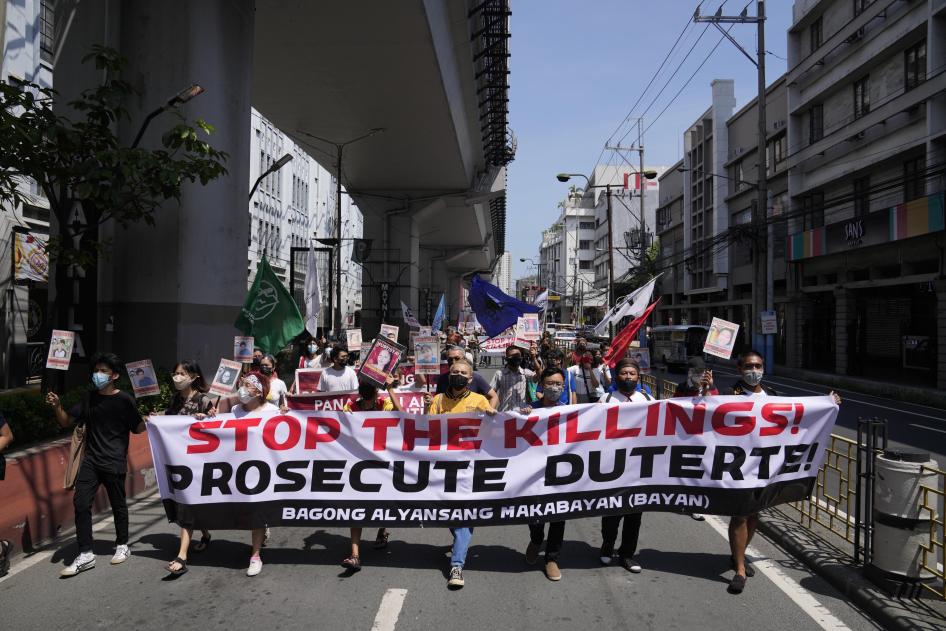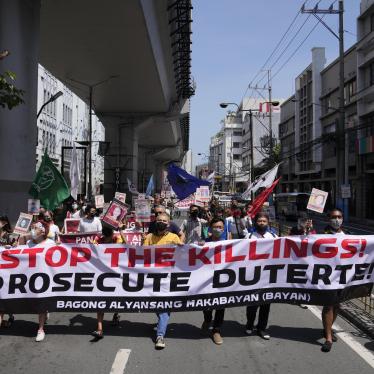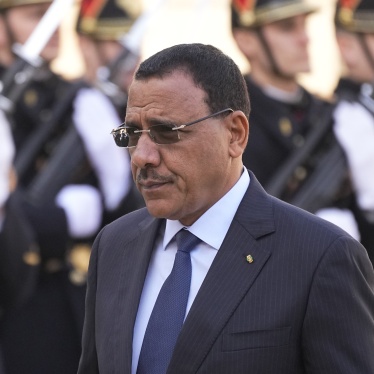- Why did the ICC open an investigation?
- What happened before the January 26 decision, and why was the investigation on hold?
- Why did the judges authorize the resumption of the ICC investigation?
- Didn’t the Philippines leave the ICC? Why can the ICC prosecutor still investigate there?
- What’s next? How long until a trial?
- Who is likely to be the target of ICC investigations? How many people could be charged?
- Even if the ICC issues charges against individuals for crimes committed in the Philippines, will arrests ever be possible?
On January 26, 2023, a pre-trial chamber of the International Criminal Court (ICC) authorized the court’s prosecutor to resume his investigation into the situation in the Philippines. The investigation covers alleged crimes committed from November 2011 to June 2016, including the large number of extrajudicial killings in Davao City while former President Rodrigo Duterte was its mayor as well as in other parts the country during his presidency up until March 16, 2019, a day before the Philippines’ withdrawal from the ICC’s founding treaty, the Rome Statute, took effect. The Philippine government appealed the January 26 decision on February 3. That appeal is pending.
The ICC is an independent judicial institution empowered to investigate and prosecute individuals for war crimes, crimes against humanity, genocide, and the crime of aggression. Its establishment in 2002 signaled the commitment of many countries to fight impunity for the worst international crimes. Currently, 123 countries are ICC members, giving the ICC authority under the Rome Statute to investigate and prosecute crimes committed by their nationals or by anyone on their territory. The ICC is a court of last resort, which means that it will only step in if national authorities are unwilling or unable to investigate and prosecute crimes within the ICC’s mandate.
The following questions and answers provided by Human Rights Watch discuss the judges’ recent decision to authorize the resumption of the Philippines investigation, the appeal, and next steps.
1. Why did the ICC open an investigation?
Soon after taking office in 2016, then-President Rodrigo Duterte unleashed his “war on drugs,” which resulted in thousands of killings, mostly of the urban poor. Human Rights Watch and others found that the police regularly falsified evidence to justify the unlawful killings. The government reported that members of the Philippine National Police and the Philippine Drug Enforcement Agency killed 6,252 people during anti-drug operations from July 1, 2016, to May 31, 2022. After Ferdinand Marcos Jr. became president in 2022, the government stopped releasing these statistics.
The official death toll does not include those killed by unidentified gunmen whom Human Rights Watch and other rights monitors have credible evidence to believe operate in cooperation with local police and officials. The United Nations Office of the High Commissioner for Human Rights (OHCHR) calculated in a 2020 report that the death toll was at least 8,663. Domestic human rights groups and the government-appointed Philippine Commission on Human Rights state that the real number of “drug war” killings is possibly triple the number included in the UN report.
The scale of the “drug war” killings prompted the then-ICC prosecutor, Fatou Bensouda, to announce in February 2018 the opening of a preliminary examination over the deaths, many of which are linked to “extrajudicial killings in the course of police anti-drug operations.” In May 2021, following her analysis of these crimes, Bensouda requested the court’s authorization to open an investigation into the situation in the Philippines. The ICC pre-trial chamber authorized the opening of the investigation in September 2021.
2. What happened before the January 26 decision, and why was the investigation on hold?
In November 2021, the Philippine government asked the ICC prosecutor to defer the investigation, claiming that national authorities had begun their own investigations into cases of extrajudicial killings attributed to the police during “drug war” operations. Upon receipt of the request, the prosecutor temporarily suspended investigative activities pending his assessment of the request.
In June 2022, the court’s current prosecutor, Karim Khan, asked the ICC judges for authorization to resume his investigation, noting that the Philippine government had not substantiated its deferral request and that the domestic proceedings referenced “[did] not sufficiently mirror the court’s investigation.”
3. Why did the judges authorize the resumption of the ICC investigation?
In reaching their decision to resume the investigation, the ICC judges examined materials from the Philippine government and the ICC prosecutor, as well as observations by victims and their families, to assess the existence of domestic proceedings that would warrant a deferral of the investigation to domestic authorities through genuine investigations and prosecutions of crimes under the jurisdiction of the court.
This assessment included information on non-criminal proceedings allegedly concerning crimes under the jurisdiction of the court, namely:
- A review conducted by a Philippine Department of Justice panel – This is “an ad hoc group of Department of Justice members chaired by the Secretary of Justice” tasked with reviewing administrative and criminal cases against personnel of the Philippine National Police involved in anti-illegal drugs operations resulting in deaths.” The ICC judges found that this review does not amount to relevant investigations warranting a deferral of the ICC investigation and that the number of cases reviewed by the panel is low compared to the number of killings allegedly committed during “war on drugs” operations.
- “Writ of amparo proceedings” – Under Philippine law, this is a “remedy available to any person whose right to life, liberty and security is violated or threatened with violation by an unlawful act or omission by a public official or employee, or a private individual or entity.” These proceedings may lead to criminal investigations, but the judges found that this mere possibility is not sufficient to justify a deferral.
- Activities of the Administrative Order No. 35 Committee and the United Nations Joint Program on Human Rights – The Administrative Order No. 35 Committee is an inter-agency committee chaired by the justice secretary and focusing on extra-legal killings, enforced disappearances, torture and other grave violations of the right to life, liberty, and security of persons. The United Nations Joint Program on Human Rights is a technical assistance and capacity building program. According to the judges, neither carried out concrete investigative steps relevant for a deferral.
- Investigations conducted by the Philippine National Police’s Internal Affairs Services – These are disciplinary proceedings against police personnel that, according to the judges, do not have the primary aim to further criminal proceedings and thus do not justify a deferral of the ICC investigation.
The judges’ assessment also included information on any criminal proceedings concerning alleged crimes committed in the Davao City region between 2011 and 2016, conduct other than murder that might amount to crimes against humanity, alleged killings outside of official police operations, including those by “vigilantes,” and any alleged state or organizational policy related to crimes against humanity.
Based on this analysis, the three-judge ICC panel concluded that the Philippine government had failed to substantiate its assertions that it was taking sufficient action to investigate and prosecute the killings that took place during former President Duterte’s administration. They stated that the Philippine government’s domestic initiatives “assessed collectively, do not amount to tangible, concrete and progressive investigative steps in a way that would sufficiently mirror the court’s investigation.”
4. Didn’t the Philippines leave the ICC? Why can the ICC prosecutor still investigate there?
On March 17, 2018, then-President Duterte formally notified the United Nations secretary-general that the Philippines was withdrawing from the ICC’s Rome Statute. In accordance with the ICC treaty, the withdrawal took effect one year later. The provisions of the Rome Statute permit the court to retain its jurisdiction over crimes committed prior to withdrawal. In the case of the Philippines, this was from November 1, 2011 – the date in which the Rome Statute went into effect in the Philippines – up to and including March 16, 2019.
In their January 26 decision, the ICC judges addressed the Philippine government’s claim that the court does not have jurisdiction over the situation in the Philippines under the principles of non-intervention and sovereign equality as enshrined in the United Nations Charter. Non-intervention relates to the right of states to conduct their domestic affairs without outside interference. Sovereign equality concerns the equal standing of states within the international community.
The judges stated: “By ratifying the Statute, the Philippines explicitly accepted the jurisdiction of the Court, within the limits mandated by the treaty, and pursuant to how the system of complementarity functions.” They further noted that relevant “ensuing obligations remain applicable, notwithstanding the Philippines withdrawal from the Statute.” This includes the Philippine government’s obligation to cooperate with the court in connection with the investigation. The ICC relies on cooperation from its member countries to implement its mandate, including access to crime scenes, witnesses, and arrests.
5. What’s next? How long until a trial?
On February 3, 2023, the government of the Philippines appealed the January 26 decision authorizing the resumption of the ICC investigation and requested the suspension of the investigation while the appeal is pending. If the judges in the ICC appeals chamber do not confirm the authorization to resume the investigation, the prosecutor will have to close his investigation into the situation in the Philippines. If they confirm the authorization to resume the investigation, the investigation will continue.
ICC investigations may or may not lead to trials.
In conducting an independent investigation, the prosecutor could determine that there is insufficient evidence that crimes committed within the court's jurisdiction have taken place. If the prosecutor decides not to proceed with prosecutions following his investigation, this decision can be reviewed by the pre-trial chamber.
If, based on the investigation, the prosecutor decides to pursue prosecutions, the ICC judges will need to approve the issuance of arrest warrants or summons to appear for individuals on the basis of specific charges. This requires a determination by the judges that there are reasonable grounds to believe that the individual named in the request has committed a crime within the jurisdiction of the court, and either that an arrest is necessary or summons to appear is sufficient to ensure the individual’s appearance before the court.
It is difficult to predict how long it might be between the beginning of an investigation and the issuance of arrest warrants or summonses to appear. In the court’s previous investigations in cases in other countries, the time before any arrest warrants or summonses to appear were issued has ranged from a little less than two months to over six years.
Once an individual appears before the court, either following an arrest or a summons, the next step is pre-trial proceedings known as "confirmation of charges.” During confirmation-of-charges proceedings, judges determine whether the available evidence establishes “substantial grounds” to believe that the person committed each of the crimes charged in the indictment. If a charge or charges are confirmed, a trial date is set.
6. Who is likely to be the target of ICC investigations? How many people could be charged?
Criminal liability before the ICC can apply to those who commit crimes, but also to those who give orders, as well as those in a position of command who should have been aware of the abuses and failed to prevent them or report or prosecute those responsible. At the ICC there is no exemption from liability based on official position.
It is a policy of the ICC prosecutor to target those most responsible for the crimes.
7. Even if the ICC issues charges against individuals for crimes committed in the Philippines, will arrests ever be possible?
Securing arrests is one of the ICC’s most difficult challenges. Without its own police force, the court must rely on states and the international community to assist in arrests. The court has issued arrest warrants against 14 individuals in various countries that have not yet been executed, and some of these warrants are now almost 18 years old.
However, arrests do happen. At least 13 ICC suspects have been arrested to date.
Arrests can take time, particularly where those sought are high-ranking government officials, but usually have occurred with sufficient international support. Charles Taylor, the former Liberian president, was apprehended to face charges at the UN-backed Special Court for Sierra Leone after three years of safe haven in Nigeria. Similarly, after many years of evading justice, high-level suspects were arrested and faced trial by the International Criminal Tribunal for the former Yugoslavia.








